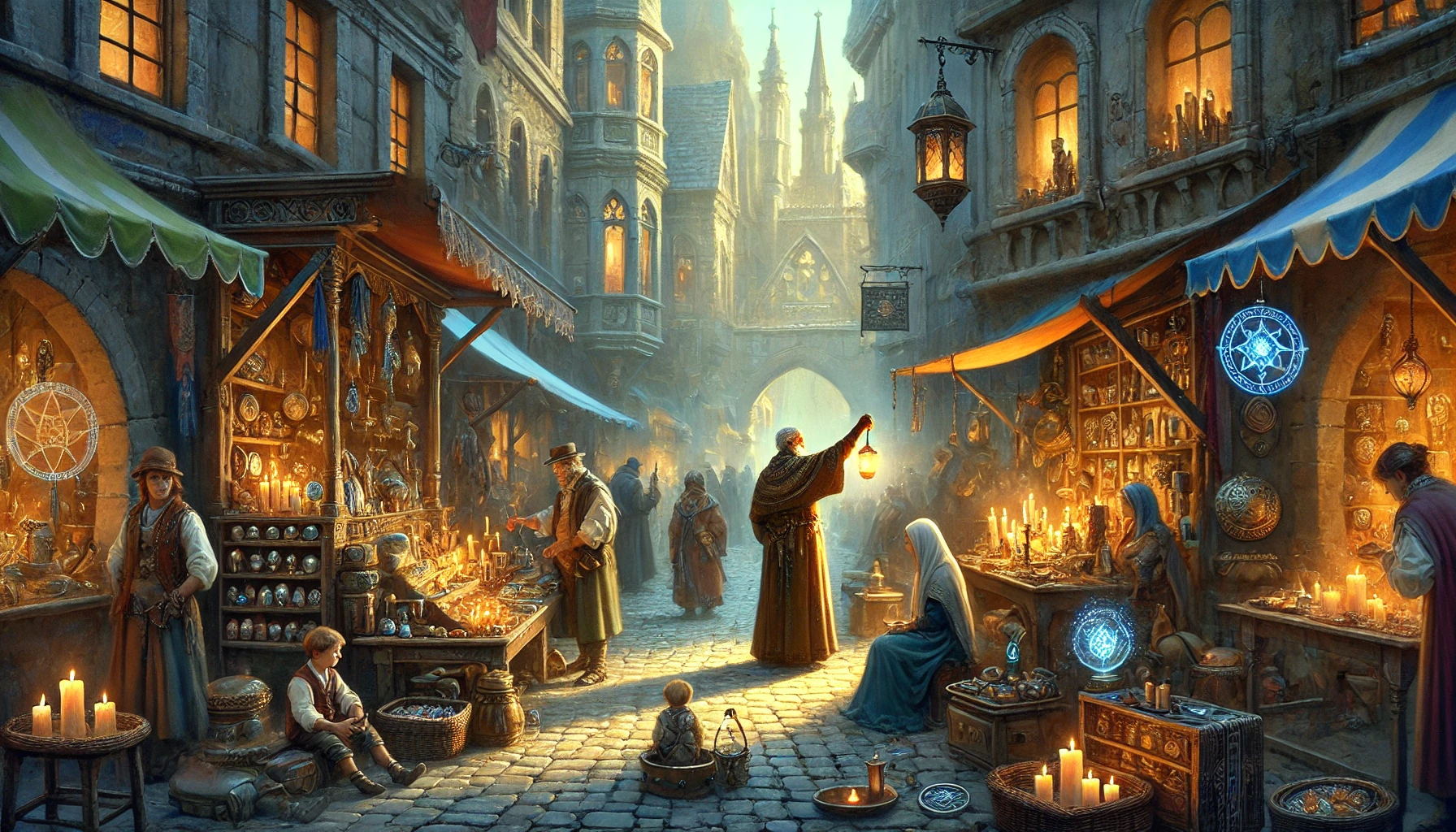Magic and Society
The Role of Magic Before the Civil War
In the centuries before the civil war, magic was an everyday blessing woven into nearly every aspect of society. Skilled practitioners offered their abilities as healers, enhancers of crops, protectors of hunters, and performers of magical artistry during communal celebrations. While some powerful mages established respected workshops or accepted roles as advisors to noble houses, others traveled between remote settlements, offering their talents in exchange for food or shelter. Among the most revered were those with the rare ability to sense emotional truth—unable to read thoughts directly, but capable of perceiving hidden feelings and deception. Masters of magic—especially those in the service of the crown—were often held in awe and suspicion alike. A few withdrew into seclusion, living in solitary estates or remote towers to pursue deeper magical study. In contrast, The Druids, who practiced a more elven-aligned form of magic, lived in quiet harmony with nature. They were seen as secretive but generally benevolent and wise.Magic in the Age of the Church
With the rise of The Holy Dominion following the civil war, all this changed. The Church condemned all forms of magic as heresy, declaring it a corruption of the divine order. The punishment for its use was—and remains—death. In towns and cities under Dominion control, magic use is almost entirely suppressed. Even the use of herbs for healing is viewed with suspicion, especially if recovery is unusually swift. In the countryside, however, far from The Church's reach, the old ways endure in secret. Magic is still quietly practiced for healing wounds, enhancing harvests, and protecting homesteads.What Magic Replaced
Before the civil war, reliance on magic stunted technological advancement. Hunting and agriculture were made easier by magical aid, removing the pressure to develop more efficient tools or methods. The same was true of medicine—why invent treatments when magic could mend a broken limb or cure a fever overnight? This dependence became a quiet vulnerability. When magic vanished from cities almost overnight, many communities were left unprepared.The View of Magic Users
Before the civil war, magic users were pillars of their communities—trusted, respected, sometimes revered. The more powerful, however, were viewed with caution. Crown-appointed mages held political sway, and their presence often stirred unease. The Druids stood apart. With their deeply rooted connection to nature and their near-elven insight into magic, they were honored in rural areas but rarely seen. After the civil war, magic users became outlaws. Association with them was dangerous, and The Church's doctrine made no distinction between benevolence and threat. Still, in the wilderness and distant villages, where Dominion eyes seldom reached, the old reverence quietly persisted.Magic and Political Power
Before the civil war, the crown sought to control powerful mages—employing those it could, surveilling the rest. Magic was a resource to be monitored, not unleashed. Tensions between mages and rulers were common, especially when magical knowledge ran deeper than political wisdom. After the war, The Church rose from the ashes with one absolute stance: all magic is abomination. The supreme priest declared a holy edict—any who used magic, or sheltered those who did, were to be executed.The Edict of Cleansing
By Order of the Grand Prelate and the Holy Light of the DominionYear 4 of the Great Reclamation Let it be known, in all corners of the land, that magic is an affront to the natural order as ordained by the Maker. Henceforth, by decree of the Divine Seat and with the full authority granted by the Eternal Codex of Daghda: All practice of unnatural arts—including, but not limited to: healing beyond reason, conjuring of flame without flint, speech with beasts, tampering with winds, illusions of light or voice, and any manipulation of the mind—is strictly forbidden. Any individual found to practice, harbor, or conspire with wielders of magic shall be tried and judged under the laws of sanctified justice.
- The punishment for practitioners is death by flame, that their corruption may be purified.
- The punishment for accomplices is death by stoning, that they may serve as a warning to others.
“Let none be swayed by wonders, nor fooled by false light. For it is not healing they offer, but illusion—tools of ruin, not salvation. Root them out, and let flame be your mercy.”
The Healer’s Dilemma She had hidden her gift since the purges, but when the fever came for the miller’s boy, she faced a choice. The child lived. By morning, she was gone—and the fields bloomed unusually well that year.


Comments